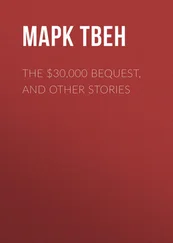Mark Twain - The 30,000 Dollar Bequest and Other Stories
Здесь есть возможность читать онлайн «Mark Twain - The 30,000 Dollar Bequest and Other Stories» весь текст электронной книги совершенно бесплатно (целиком полную версию без сокращений). В некоторых случаях можно слушать аудио, скачать через торрент в формате fb2 и присутствует краткое содержание. Год выпуска: 2004, Жанр: Классическая проза, на английском языке. Описание произведения, (предисловие) а так же отзывы посетителей доступны на портале библиотеки ЛибКат.
- Название:The 30,000 Dollar Bequest and Other Stories
- Автор:
- Жанр:
- Год:2004
- ISBN:нет данных
- Рейтинг книги:4 / 5. Голосов: 1
-
Избранное:Добавить в избранное
- Отзывы:
-
Ваша оценка:
- 80
- 1
- 2
- 3
- 4
- 5
The 30,000 Dollar Bequest and Other Stories: краткое содержание, описание и аннотация
Предлагаем к чтению аннотацию, описание, краткое содержание или предисловие (зависит от того, что написал сам автор книги «The 30,000 Dollar Bequest and Other Stories»). Если вы не нашли необходимую информацию о книге — напишите в комментариях, мы постараемся отыскать её.
The 30,000 Dollar Bequest and Other Stories — читать онлайн бесплатно полную книгу (весь текст) целиком
Ниже представлен текст книги, разбитый по страницам. Система сохранения места последней прочитанной страницы, позволяет с удобством читать онлайн бесплатно книгу «The 30,000 Dollar Bequest and Other Stories», без необходимости каждый раз заново искать на чём Вы остановились. Поставьте закладку, и сможете в любой момент перейти на страницу, на которой закончили чтение.
Интервал:
Закладка:
When a queen whose qualities of mind and heart and character are able to add distinction to so distinguished a place as a throne, remembers with grateful exultation, after thirty years, honors and distinctions conferred upon her by the humble, wild creatures of the forest, we are helped to realize that complimentary attentions, homage, distinctions, are of no caste, but are above all cast—that they are a nobility-conferring power apart.
We all like these things. When the gate-guard at the railway-station passes me through unchallenged and examines other people's tickets, I feel as the king, class A, felt when the emperor put the imperial hand on his shoulder, "everybody seeing him do it"; and as the child felt when the random dog allowed her to pat his head and ostracized the others; and as the princess felt when the wasps spared her and stung the rest; and I felt just so, four years ago in Vienna (and remember it yet), when the helmeted police shut me off, with fifty others, from a street which the Emperor was to pass through, and the captain of the squad turned and saw the situation and said indignantly to that guard:
"Can't you see it is the Herr Mark Twain? Let him through!"
It was four years ago; but it will be four hundred before I forget the wind of self-complacency that rose in me, and strained my buttons when I marked the deference for me evoked in the faces of my fellow-rabble, and noted, mingled with it, a puzzled and resentful expression which said, as plainly as speech could have worded it: "And who in the nation is the Herr Mark Twain UM GOTTESWILLEN?"
How many times in your life have you heard this boastful remark:
"I stood as close to him as I am to you; I could have put out my hand and touched him."
We have all heard it many and many a time. It was a proud distinction to be able to say those words. It brought envy to the speaker, a kind of glory; and he basked in it and was happy through all his veins. And who was it he stood so close to? The answer would cover all the grades. Sometimes it was a king; sometimes it was a renowned highwayman; sometimes it was an unknown man killed in an extraordinary way and made suddenly famous by it; always it was a person who was for the moment the subject of public interest of a village.
"I was there, and I saw it myself." That is a common and envy-compelling remark. It can refer to a battle; to a handing; to a coronation; to the killing of Jumbo by the railway-train; to the arrival of Jenny Lind at the Battery; to the meeting of the President and Prince Henry; to the chase of a murderous maniac; to the disaster in the tunnel; to the explosion in the subway; to a remarkable dog-fight; to a village church struck by lightning. It will be said, more or less causally, by everybody in America who has seen Prince Henry do anything, or try to. The man who was absent and didn't see him to anything, will scoff. It is his privilege; and he can make capital out of it, too; he will seem, even to himself, to be different from other Americans, and better. As his opinion of his superior Americanism grows, and swells, and concentrates and coagulates, he will go further and try to belittle the distinction of those that saw the Prince do things, and will spoil their pleasure in it if he can. My life has been embittered by that kind of person. If you are able to tell of a special distinction that has fallen to your lot, it gravels them; they cannot bear it; and they try to make believe that the thing you took for a special distinction was nothing of the kind and was meant in quite another way. Once I was received in private audience by an emperor. Last week I was telling a jealous person about it, and I could see him wince under it, see him bite, see him suffer. I revealed the whole episode to him with considerable elaboration and nice attention to detail. When I was through, he asked me what had impressed me most. I said:
"His Majesty's delicacy. They told me to be sure and back out from the presence, and find the door-knob as best I could; it was not allowable to face around. Now the Emperor knew it would be a difficult ordeal for me, because of lack of practice; and so, when it was time to part, he turned, with exceeding delicacy, and pretended to fumble with things on his desk, so I could get out in my own way, without his seeing me."
It went home! It was vitriol! I saw the envy and disgruntlement rise in the man's face; he couldn't keep it down. I saw him try to fix up something in his mind to take the bloom off that distinction. I enjoyed that, for I judged that he had his work cut out for him. He struggled along inwardly for quite a while; then he said, with a manner of a person who has to say something and hasn't anything relevant to say:
"You said he had a handful of special-brand cigars on the table?"
"Yes; I never saw anything to match them."
I had him again. He had to fumble around in his mind as much as another minute before he could play; then he said in as mean a way as I ever heard a person say anything:
"He could have been counting the cigars, you know."
I cannot endure a man like that. It is nothing to him how unkind he is, so long as he takes the bloom off. It is all he cares for.
"An Englishman (or other human being) does dearly love a lord," (or other conspicuous person.) It includes us all. We love to be noticed by the conspicuous person; we love to be associated with such, or with a conspicuous event, even in a seventh-rate fashion, even in the forty-seventh, if we cannot do better. This accounts for some of our curious tastes in mementos. It accounts for the large private trade in the Prince of Wales's hair, which chambermaids were able to drive in that article of commerce when the Prince made the tour of the world in the long ago—hair which probably did not always come from his brush, since enough of it was marketed to refurnish a bald comet; it accounts for the fact that the rope which lynches a negro in the presence of ten thousand Christian spectators is salable five minutes later at two dollars and inch; it accounts for the mournful fact that a royal personage does not venture to wear buttons on his coat in public.
We do love a lord—and by that term I mean any person whose situation is higher than our own. The lord of the group, for instance: a group of peers, a group of millionaires, a group of hoodlums, a group of sailors, a group of newsboys, a group of saloon politicians, a group of college girls. No royal person has ever been the object of a more delirious loyalty and slavish adoration than is paid by the vast Tammany herd to its squalid idol in Wantage. There is not a bifurcated animal in that menagerie that would not be proud to appear in a newspaper picture in his company. At the same time, there are some in that organization who would scoff at the people who have been daily pictured in company with Prince Henry, and would say vigorously that THEY would not consent to be photographed with him—a statement which would not be true in any instance. There are hundreds of people in America who would frankly say to you that they would not be proud to be photographed in a group with the Prince, if invited; and some of these unthinking people would believe it when they said it; yet in no instance would it be true. We have a large population, but we have not a large enough one, by several millions, to furnish that man. He has not yet been begotten, and in fact he is not begettable.
You may take any of the printed groups, and there isn't a person in the dim background who isn't visibly trying to be vivid; if it is a crowd of ten thousand—ten thousand proud, untamed democrats, horny-handed sons of toil and of politics, and fliers of the eagle—there isn't one who is trying to keep out of range, there isn't one who isn't plainly meditating a purchase of the paper in the morning, with the intention of hunting himself out in the picture and of framing and keeping it if he shall find so much of his person in it as his starboard ear.
Читать дальшеИнтервал:
Закладка:
Похожие книги на «The 30,000 Dollar Bequest and Other Stories»
Представляем Вашему вниманию похожие книги на «The 30,000 Dollar Bequest and Other Stories» списком для выбора. Мы отобрали схожую по названию и смыслу литературу в надежде предоставить читателям больше вариантов отыскать новые, интересные, ещё непрочитанные произведения.
Обсуждение, отзывы о книге «The 30,000 Dollar Bequest and Other Stories» и просто собственные мнения читателей. Оставьте ваши комментарии, напишите, что Вы думаете о произведении, его смысле или главных героях. Укажите что конкретно понравилось, а что нет, и почему Вы так считаете.












